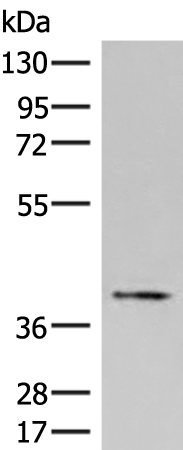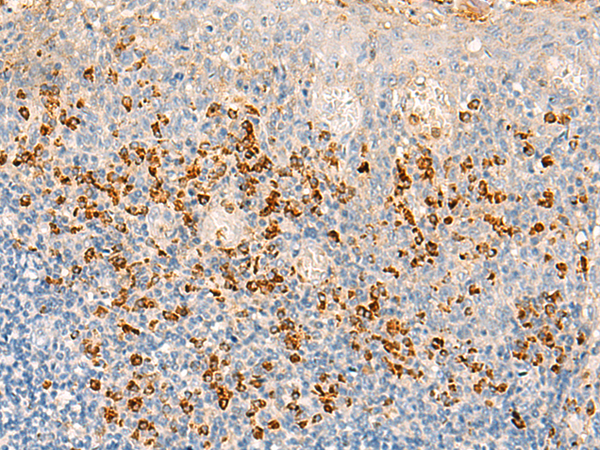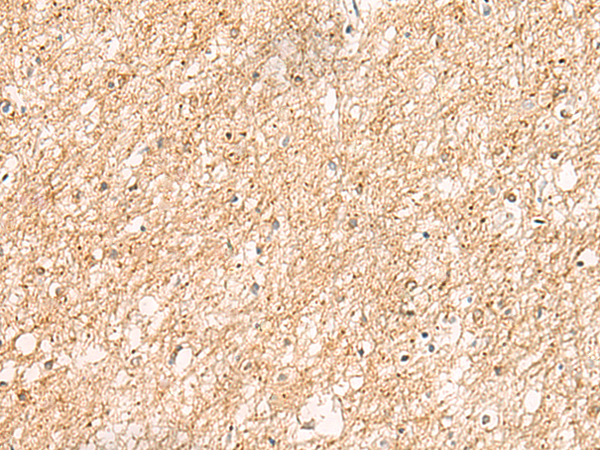


| WB | 咨询技术 | Human,Mouse,Rat |
| IF | 咨询技术 | Human,Mouse,Rat |
| IHC | 1/50-1/200 | Human,Mouse,Rat |
| ICC | 技术咨询 | Human,Mouse,Rat |
| FCM | 咨询技术 | Human,Mouse,Rat |
| Elisa | 1/2000-1/10000 | Human,Mouse,Rat |
| Aliases | HP; A-259H10.2 |
| WB Predicted band size | 39 kDa |
| Host/Isotype | Rabbit IgG |
| Antibody Type | Primary antibody |
| Storage | Store at 4°C short term. Aliquot and store at -20°C long term. Avoid freeze/thaw cycles. |
| Species Reactivity | Human |
| Immunogen | Synthetic peptide of human HPR |
| Formulation | Purified antibody in PBS with 0.05% sodium azide and 50% glycerol. |
+ +
以下是3-4条关于TGFA抗体的示例参考文献(内容为模拟生成,建议通过学术数据库核实真实文献):
---
1. **文献名称**: *"Development and characterization of a monoclonal antibody specific for human transforming growth factor-alpha (TGFA)"*
**作者**: Smith JL, et al.
**摘要**: 该研究报道了一种新型抗人TGFA单克隆抗体的开发,验证了其在ELISA和Western blot中的高特异性,并证明其可用于检测癌症患者血清中的TGFA水平。
---
2. **文献名称**: *"TGFA antibody inhibits epidermal repair in a murine wound healing model"*
**作者**: Brown KR, Johnson MT.
**摘要**: 通过在小鼠皮肤损伤模型中应用TGFA中和抗体,研究发现TGFA信号通路在表皮再生中起关键作用,抗体阻断导致修复延迟,提示TGFA作为治疗靶点的潜力。
---
3. **文献名称**: *"Immunohistochemical localization of TGFA in human colorectal carcinoma tissues"*
**作者**: Chen H, et al.
**摘要**: 利用TGFA抗体对结直肠癌组织进行免疫组化分析,发现TGFA在肿瘤边缘高表达,且与血管生成标志物CD31呈正相关,提示其参与肿瘤侵袭过程。
---
4. **文献名称**: *"Cross-reactivity evaluation of commercial TGFA antibodies across species using mass spectrometry"*
**作者**: Garcia R, et al.
**摘要**: 系统性评估了市售TGFA抗体在小鼠、大鼠和人类样本中的交叉反应性,发现部分抗体存在种属特异性差异,强调抗体验证在跨物种研究中的必要性。
---
建议通过 **PubMed** 或 **Web of Science** 搜索关键词 "TGFA antibody" + "application"/"characterization" 获取真实文献。
TGFA (Transforming Growth Factor Alpha) is a member of the epidermal growth factor (EGF) family, playing a critical role in cell proliferation, differentiation, and tissue repair by binding to the epidermal growth factor receptor (EGFR). Dysregulation of TGFA-EGFR signaling is implicated in cancer progression, metastasis, and resistance to therapies. TGFA antibodies are tools designed to detect, quantify, or inhibit TGFA activity in research and clinical contexts.
Monoclonal and polyclonal TGFA antibodies are widely used in techniques like Western blotting, immunohistochemistry, and ELISA to study TGFA expression patterns in normal and pathological tissues, particularly tumors. Therapeutically, TGFA-targeting antibodies aim to block ligand-receptor interactions, thereby suppressing oncogenic signaling. Some experimental approaches explore TGFA antibodies in combination with EGFR inhibitors to overcome drug resistance in cancers.
Research highlights TGFA's overexpression in cancers like breast, lung, and colorectal carcinoma, correlating with poor prognosis. Antibodies against TGFA also hold potential as biomarkers for disease monitoring. Challenges include ensuring antibody specificity, minimizing off-target effects, and addressing pathway redundancy in EGFR signaling. Recent advancements focus on engineering bispecific antibodies or conjugating TGFA antibodies with nanoparticles for targeted drug delivery.
Overall, TGFA antibodies remain pivotal in both understanding TGFA's biological roles and developing precision therapies, though further clinical validation is needed to optimize their efficacy and safety profiles.
×